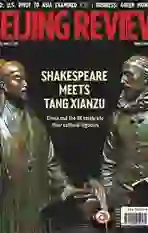The Selection Game
2016-06-08ByJinBiao
By+Jin+Biao
The UN kicked off the first-ever public examination of applicants seeking to lead one of the worlds largest intergovernmental organizations on April 12, when interviews for the nine candidates vying to replace Secretary General Ban Ki-moon began.
For the UN secretary general, as the top administrator of the organization comprising 193 member states, the main responsibility is to prevent international disputes and safeguard the UNs values and moral authority, based on the principles of independence, fairness and honesty.
To effectively fulfill these duties, a combina
tion of skillful public administration and personal charisma should be employed. Thus, a capable UN head requires exceptional leadership and management abilities as well as rich diplomatic experience and multilingual communication skills. All nine candidates have already demonstrated their caliber in meeting these criteria, yet only one can be chosen.
During the selection process, gender balance has become a focus of attention. Historically, all previous eight UN secretary generals have been male, leading to many UN members saying that the time is ripe for the first female leader. Since four of the candidates are women, there is a reasonable chance of this happening.
Female applicants have pledged more active efforts to promote overall gender balance if selected for the post. Natalia Gherman, former Minister of Foreign Affairs and European Integration of Moldova, declared that she would appoint capable female officials to important UN posts. Helen Clark, current Administrator of the UN Development Program and former Prime Minister of New Zealand, said that she would push hard for the promotion of gender equality and womens empowerment. Another candidate, Irina Bokova, serving as director general of the UN Educational, Scientific and Cultural Organization and former Bulgarian Foreign Minister, claimed that this century is the era to make a genuine commitment to gender equality.
Selection rules
The UNs latest moves to publicly select its head and place greater emphasis on gender balance are welcomed by the international community. However, the prevalence of some unofficial rules remains.
A single term for a UN secretary general lasts five years. Though there is no formal limit on the number of terms in office that incumbents can serve, so far nobody has held the post for more than two terms. Another convention for the position is a regional rotation scheme, in which the selection is made from one of the five UN regional groups every decade. Three of the previous eight heads were from the Western European and Others Group, two were from the Asia-Pacific Group, another two were from the African Group, and one was from the Latin American and Caribbean Group. Prospective candidate Srgjan Kerim from Macedonia said frankly that the next UN secretary general should therefore come from the Eastern European Group.
Additionally, it hasnt been customary to appoint someone to the role from any of the Security Councils five permanent members(P5), namely China, France, Russia, the United Kingdom and the United States. Though the post is to serve the global community, and the nationality of the secretary general should be played down, previous leaders were mostly from smaller countries. This system is designed to augment equilibrium between major powers in the organization.
Nonetheless, the P5 have the final say in selection, as the appointment of the secretary general by the UN General Assembly is based on the Security Councils recommendation.Since these countries have the power to veto a nomination, applicants with a keen interest in a UN leadership race may begin to seek approval a year or two ahead of the official process.
The P5 also has considerable influence on re-appointments. Among the previous eight UN secretary generals, only Boutros Boutros Ghali from Egypt failed to secure a second term. His public criticism of unpaid UN dues owed by the United States led to Washingtons use of its veto to block his re-appointment.
The UN reflects the international balance of power following World War II. Though 70 years have passed, the system has not fundamentally changed and is still weighted toward the P5 members. In spite of recent reforms to the selection process, for any UN general secretary hopeful, utilizing national resources to gain support from the major powers is key to being selected.
Tough job
No matter who is victorious, the challenges facing the next UN leader will be significant. Some long-standing problems include low efficiency, overstaffing, fiscal difficulties, and the inability to handle global problems as well as sluggish institutional reform.
Some candidates have proposed solutions. Danilo Turk, former President of Slovenia, said that he would accelerate UN and Security Council reforms if he wins. Vesna Pusi?, former Croatian Deputy Prime Minister and Foreign Minister, pledged efforts to simplify the decisionmaking and reporting procedures to make the world body more transparent.
Urgent tasks for the new head also include making progress on the 2030 Agenda for Sustainable Development, promoting human rights and the rule of law as well as addressing climate change and the migrant crisis. Adapting to the global situation and strengthening the UNs role in the interna- tional community are also very important for the next secretary general.
These problems have emerged during the era of globalization and will require innovative ideas from the international community to solve them. The development of global governance provides a platform for the UN to play a larger role in international affairs. This can be achieved by enhancing its ability to tackle challenges through the coordination of its member states for increased political consensus and furthering bonds with other international organizations and civil society. The role of the UN secretary general will be to coordinate those processes. The public selection of the UN head should mark the beginning of a new round of reforms to increase the vitality of the world body and build a greater consensus among its member states. The international community needs a more powerful UN, which in turn requires an outstanding secretary general.
